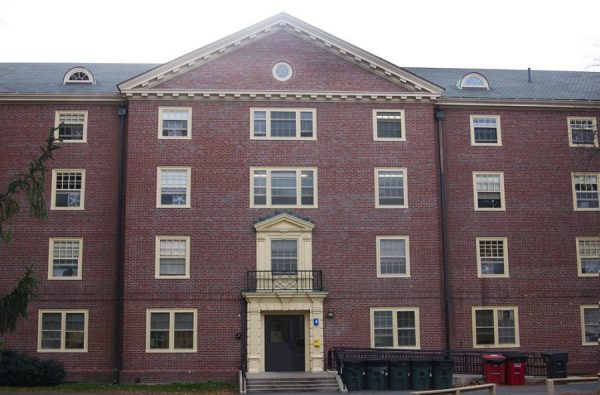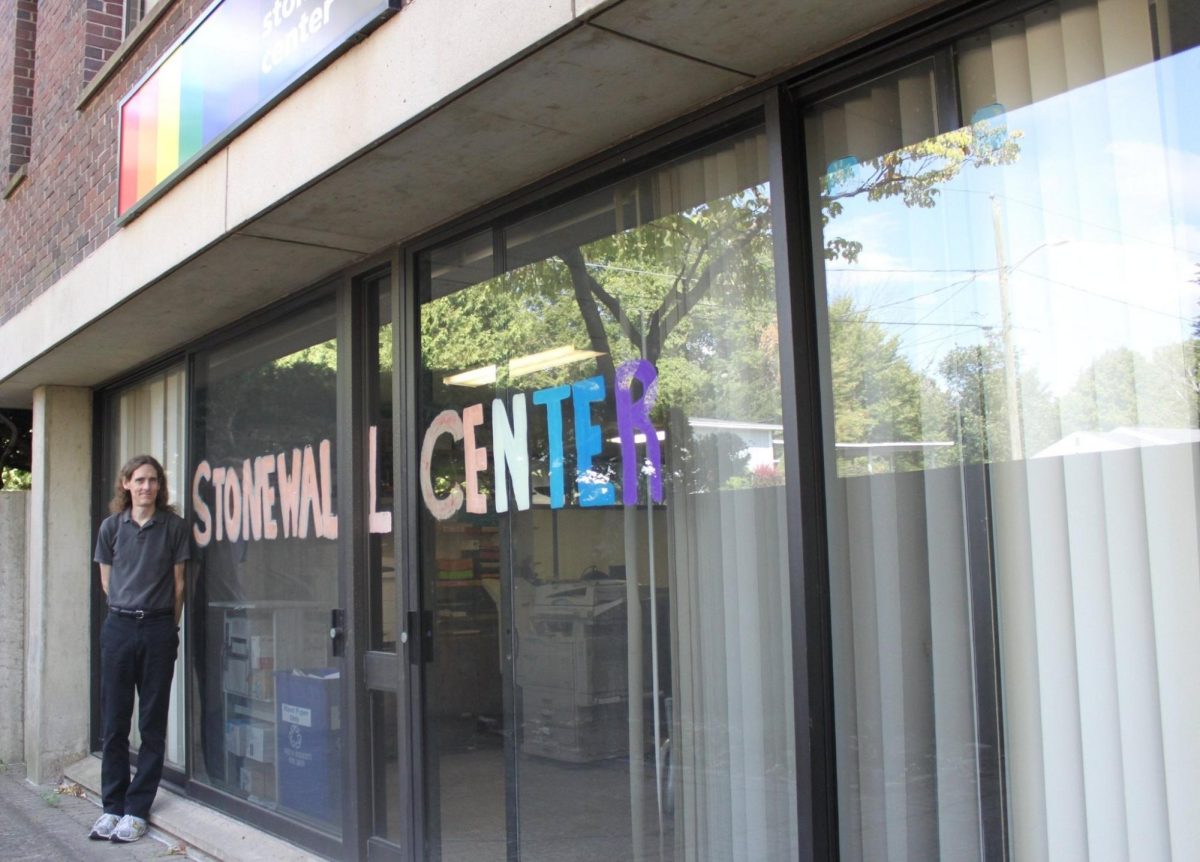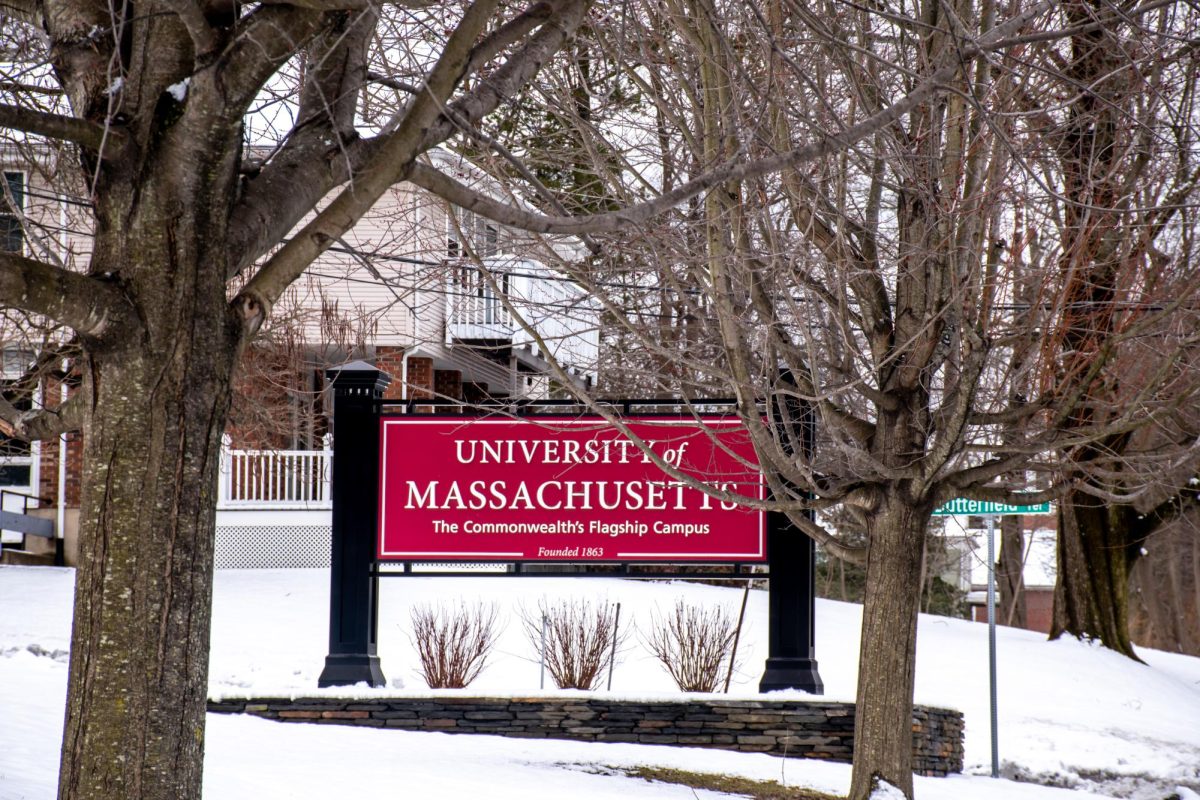CONTENT WARNING: This piece mentions sensitive topics including transphobia and suicide.
A Tragic Reminder: Consequences of Delayed Action
The University of Massachusetts’s Stonewall Center Director Dr. Genny Beemyn has been at UMass the since 2006, and one of their first goals as director was to implement a gender-inclusive housing program.
When asked how much they know about the history of GIH at the UMass, Beemyn said, “I’m the person behind it, so I know a whole lot.”
Beemyn recognized that the University had a population of trans and nonbinary students who “were uncomfortable in their housing assignments.” Students often had to live with a roommate whose gender did not match their own and were not able to come out due to fear of how roommates might react.
GIH refers to residential floors or buildings that have mixed-gender rooms, meaning that students can share a room with anyone regardless of their gender. It is an option for any student who may wish to live with a peer who does not share their gender identity, which helpful for transgender and nonbinary students.
Beemyn said that, at first, it was difficult to make progress. When they first attempted to start the program, Residential Life said that gender-inclusive housing wasn’t necessary because “there weren’t trans and non-binary students in residence halls,” according to Beemyn. Beemyn knew that this was untrue and that there were students who were trans and nonbinary, they just weren’t presenting themselves to Residential Life.
“What ended up happening was that the following year, we had a young trans woman who needed a place to live … and they didn’t have any place to put her,” Beemyn said. “They ended up putting her in Prince [Hall], which was one of the only buildings at the time that had a single-user gender-inclusive bathroom.”
Her floor housed mostly international graduate students, and as an undergraduate white woman born in the United States, she felt very isolated.
Before that school year, the student experienced a variety of challenges including homelessness and a lack of acceptance from her family and harassment due to being “readily read as being a trans woman.” She entered her new housing experience with little support and negative feelings about her own identity.
That year, she attempted suicide and left UMass, never to return and graduate.
“All of that could’ve been avoided if Residential Life had the common sense at that point to recognize the importance of gender-inclusive housing, to develop something that made sense for trans and nonbinary students … so we weren’t stuck putting somebody in a place that was not going to be an affirming environment,” Beemyn said.
Following those events, Residential Life agreed that UMass needed GIH. In 2009, they started this process in the Sylvan Residential Area. Sylvan’s suites, where students had the option to live in single rooms, made it the easiest option at the time, but Sylvan was also not a popular part of campus. Beemyn asked, “what message does that send to trans students: ‘we’re gonna put you in Sylvan, some place that students do not want to be?’”
“I really thought it needed to be in Central—some place that was really centrally located,” Beemyn added.

In 2015, Beemyn pushed Residential Life to make the switch to implementing GIH in Baker Hall, which now houses the ‘Spectrum’ Floor, a living-learning community for LGBTQ+ students and their supporters, among other GIH options.
Recently, Van Meter, a freshman dormitory, made the switch to offering GIH two years ago because of incoming student demand. Webster Hall also designated GIH options this year, due to a greater availability of gender-inclusive bathrooms.
Students can now choose from Baker, Webster, Van Meter and Cashin Halls, as well as the North Apartments and some Commonwealth Honors College suites.
Beemyn said that despite their initial struggle to collaborate with Residential Life, these changes were possible because of new people working in the department.
“The people I was working with 15 years ago … [have] been replaced with, for the most part, younger folks who have a greater understanding of trans and nonbinary people,” Beemyn said.
Although UMass boasts one of the largest on-campus student populations in the country, Residential Life now prioritizes helping “individual trans and nonbinary students” with housing concerns, according to Beemyn. “They’re wonderful to work with now,” Beemyn noted.
Students speak: Experiences in GIH
Karma Whittemore, a first-year animation major living in Van Meter Hall, mirrored Beemyn’s appreciation, describing their experience with housing as a nonbinary student as, “pretty great.”
They found out that GIH was an option during a summer orientation session. Their application process into GIH was a part of the regular first-year dorm application, and they now share a room with a female-identifying friend.
Whittemore reiterated the importance of GIH, especially for trans students like themselves who experience gender dysphoria. For them, it was comforting to know that they didn’t have to room with someone of the same sex. They were assigned male at birth but don’t identify as male and would have felt uncomfortable to live with a man.
“It’s been nice,” Whittmore added, stating it is, “What I would assume regular dorm life is, which is good for me. I wouldn’t say I really find anything wrong with it.”
Living in GIH also led to Whittemore finding community. “I have friends that live on the fourth floor of Van Meter that identify as queer or gender fluid … I see a bunch of people [in Van Meter] who are also in gender inclusive housing” Whittmore said. “Everyone there is really nice,” they said. “It’s really accepting.”
Though the expansion of GIH has created progress, there are still aspects that can improve.
“In most dorms with gender-inclusive housing, there actually are not as many all-gender bathrooms as there should be,” Whittemore said.
Some floors, such as the first floor of Van Meter, have several gender-inclusive bathrooms, but most of these bathrooms do not include showers. Additionally, bathroom cleaning schedules can create conflicts for students with early morning classes.
Beemyn noted that in the past, UMass had to receive approval from the state before building gender-inclusive bathrooms, due to Massachusetts’ Board of State Examiners of Plumbers and Gas Fitters regulations that required institutions to complete a variance application before building any multi-stall gender-neutral bathrooms.
The state is now introducing plumbing regulations that no longer include that requirement, so Beemyn is hopeful that going forward, designating gender-inclusive bathrooms as needed is “not going to be an issue as it has been in past years.”
According to the Daily Hampshire Gazette, this policy change resulted from UMass student advocacy. Last fall, Webster residents taped over signs in front of some of the hall’s gendered bathrooms to turn them into gender-neutral bathrooms. Those students became known as the “Green Tape Group,” and advocated for an elimination of the variance application.
At their meeting this past August, the board voted unanimously to change the plumbing code in support of those proposed measures. They will hold a public hearing and official vote before finalizing changes.
Towards an inclusive future: Expanding and enhancing GIH

Moving forward, Beemyn and other UMass staff aim to expand GIH and make it available to students across campus.
Tyler Bradley, the residence director for the Baker-Chadbourne-Greenough cluster and the Spectrum Defined Residential Community, agrees about the importance of continuing to expand GIH to meet rising student demand and to diversify housing options available for trans and nonbinary students.
Both Bradley and Beemyn expressed concerns in relation to the limited volume of GIH available versus the rising student demand for it. According to Beemyn, about six percent of the entering class of 2027 identifies as transgender or nonbinary, which is about 350 students. Bradley said that new students are becoming more open about their identities, and he expects the level of demand for GIH to stay the same or continue to rise in coming years.
One of Beemyn’s future goals is to have GIH floors in other buildings and places on campus to give students more choices, so they don’t have to decide “between [aspects] of their identities or interests.”
In a similar vein, Bradley added that aside from Cashin Hall, GIH is currently not in break housing. “Knowing that queer and trans students sometimes don’t have the best relationships with family back at home, break housing might be a really important thing for them,” he said.
For Fall 2024, Residential Life will change the process so that housing is based upon gender identity, rather than a student’s documented sex, according to Beemyn. Currently, all rooms outside of GIH are coded as male and female spaces.
These new measures will create rooms that are not coded as either. This change will make it easier for nonbinary students to find roommates and live in any part of campus that they wish.
Beemyn predicts that this housing shift will be “massively helpful” in meeting the demand of trans and nonbinary students living on campus.
The move ensures that students are not “forced into a gender binary when it comes to housing,” even if they are not living on GIH floors. The creation of these rooms will help meet Beemyn and Bradley’s goals around housing expansion throughout campus for trans and non-binary students.
Pending these changes, UMass will become one of the few schools in the country to have designated dorm rooms for nonbinary or genderqueer students.
“We are there to be supporting students and to be helping them with any issues they’re having, whether that’s institutionally or individually with other folks on campus,” Beemyn said on behalf of the Stonewall Center. “We are here to problem solve and advocate for students, so if there is a need, please don’t hesitate to come to us. That’s what we are here for.”
Annika Singh can be reached at [email protected].







